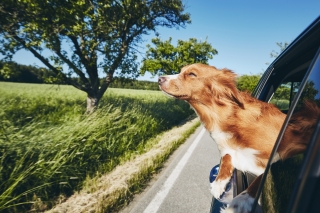Enjoy The Ride

I recently did some foundation puppy raising and training with a lovely little dog I’ll call Bob. (His name has been changed to protect the pup and his people’s privacy.) It’s joyful and gratifying work. I truly love raising puppies, they are so malleable and unencumbered with previous, often competing habits and ideas. Starting a young pup off on the right paw is by far the most efficient way to produce a trained, well mannered adult dog. Even better, puppies are never too young to start learning! Certainly not by the time they arrive in their new home sometime between 7 and 12 weeks of age.
That said, puppy training is a developmental process; it cannot be rushed. Sure a puppy’s brain is like a sponge, thirsty for knowledge, but physiologically and psychologically, their little bodies and brains can only take in so much at once. Additionally, new challenges are raised as pups mature into an adult dogs with grownup feelings, impulses, and reactions. So, affecting behavior change and maintaining “good” manners is a moving target. There is never a point where training is “done.”
I started working with Bob the day he turned 12 weeks old. I was impressed with him from the start and everyone he’s met, human or canine, has adored him as well. He took to crate training easily and prefers a clean crate, he’s very social and curious, with a touch of mischief in him, but just a touch! Enough to show that he’s got confidence in exploring the world around him and an inquisitive mind, but not so much that he’s constantly getting himself into misdeeds. He loves to chew on his appropriate chew toys.
The other day, Bob’s people told me that he is, at 18 weeks, a different dog than he was as a wee pup. They called him “rambunctious” with a bit of shock and disdain. I’d spent the better part of a month with Bob between his twelfth and fifteenth weeks and though I hadn’t seen him much in the following two weeks, I found it difficult to believe that he’d changed much since I last worked with him. When we were reunited a few days later, I was relieved to see that Bob was still the wonderfully quintessential puppy that I’d grown to love, but a puppy on the verge of adolescence. Adolescent dogs are supposed to be rambunctious, it is normal! It is our job to channel that energy into appropriate outlets and to make learning fun so as our sweet and somewhat needy puppy turns into teenagers, they don’t lose the plot or become disaffected delinquents.
The problem is, often this is when owners generally start to wind down their training, when in actuality, they should be doubling their efforts.
I find that people who have taken the time to lay a solid foundation in puppyhood get a lot of early success from their pup, behaviorally. A well-managed pup with early training will form lots of good habits, just as Bob has done. Generally this leads to a bit of a honeymoon period where everything is going so well that an owner dusts off her hands, pats her own back and says, “My work here is done.” Dare I say sometimes even a bit of smugness can be detected.
While there is no shame of showing pride in a job well done, this early success often causes a person to loosen up too much and way too soon. Puppies are time consuming, yet relatively easy creatures. Adolescent dogs (puppies become adolescent dogs as soon as their adult canines are in, around 5 months of age) are generally more confident in their environment, highly distractible as competing interests and natural impulses start to surface just as they are extremely low on impulse control, and are larger in size, full of energy and need less sleep. During this annoying rambunctious stage one might feels as though all of their early training was for nothing! This is not true, but canine teen behavior certainly can be frustrating.
Again, it’s important for people to understand that training is developmental. You’ll need to spend the first year or perhaps even 18 months of your dog’s life honing the skills you are trying to instill all while navigating the bumps of a growing up pup. House-training takes at least a year. Not just the potty part, but the chew toy training part, and he learning how to be alone part. Not to mention the coming when called part and all of the other aspects of formal training.
The good news is, after a long slow climb to adulthood, ff you break lessons down into tiny individual pieces and set your dog up for success by training with a solid foundation and lots of building blocks, you will indeed have an adult dog who merely needs a few training tuneups occasionally for much of their adult life; until old age sets in, then you must sometimes manage nearly as if they are a puppy once again.
My advice is to fully embrace the process of training your puppy. Don’t try to rush it along. You’ll build a great relationship with your pup while he learns and grows. Dogs have short life spans compared to us humans, they grow up far too fast as it is and leave us all too soon. I say buckle up and relish the early “rambunctious” months. Enjoy the ride!




